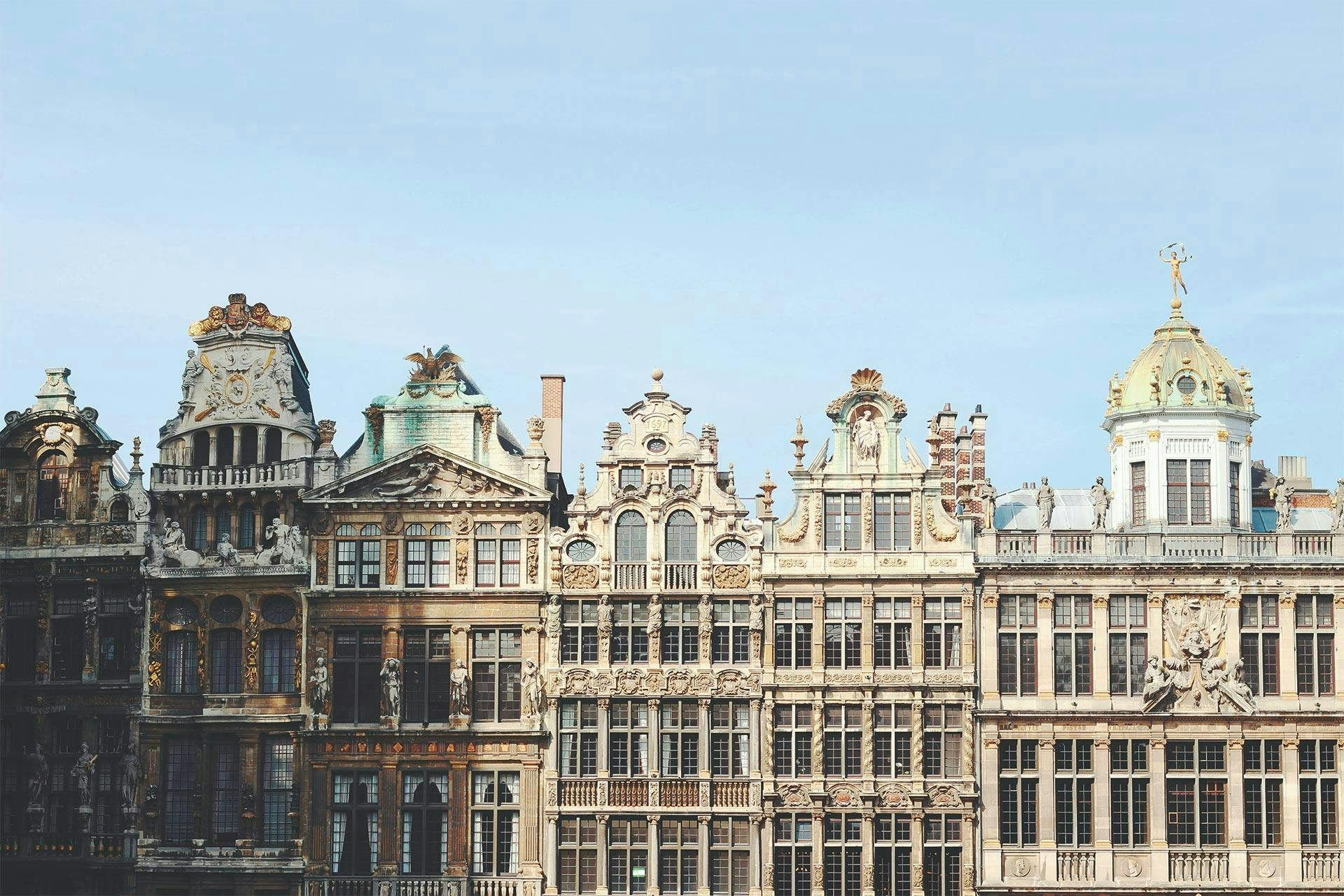Starting up in Brussels: Everything you need to know
uilt on rich history, Brussels is the very definition of a global capital. Home to the EU Parliament, EU Commission and NATO, the city is also a bustling entrepreneurship hub with the highest density of tech startups per inhabitant.
Brussels’s welcoming, open-minded residents allow for all ideas and differences, fostering innovation, creativity and a variety of delicious food, as the city’s 138 restaurants per square mile can attest. The second most cosmopolitan city on Earth knows how to live. But it’s not all beers, waffles and fries: its people devour culture as well and love projects touching all aspects of life, from startups to amateur sports teams, among other things. There’s a Brussels for everyone, and, thanks to its human warmth and relatively compact size, it’s easy to become part of the community.
With easy access to government support, an abundance of corporations encouraging entrepreneurs, myriads of international institutions and a qualified, multilingual and multicultural workforce, Brussels presents a nurturing ecosystem for starting a business. For an in-depth overview of Brussels life, visit why.brussels.
What paperwork do I need to live in Brussels?
The first thing wannabe Brusseleirs should take care of is paperwork. Although many groups and institutions exist to help people moving to Brussels, a lot of stress can be avoided by making sure you have your visa, work permit and residence permit in order. Expat communities, embassies and dedicated offices are there to help, so don’t improvise administrative tasks.
Once you arrive you have eight days to register your address with your local town hall. The city is quite safe, but don’t leave your luggage or valuables unattended in any public areas or even in your car or hotel lobby: better safe than sorry. When you go out, bring some cash as some stores are cash only (or for spontaneous purchases of street food). Also bring an umbrella, a sweater and knowledge of the weather forecast: most days go through at least two different seasons, and the climate can change quickly without due notice.

Photo: Marius Badstuber / Unsplash
Is it expensive to live in Brussels?
Avoiding tourist traps makes life in Brussels relatively inexpensive, compared to other European capitals and major cities. Housing costs will start at around €450 ($510) for a room in a shared home, €750 ($850) for a studio or €1,000 ($1130) for a two-bedroom place.
Per person, a month’s worth of groceries would average at around €250 ($280) and dining out at €30 ($34) including a glass of wine or two, with an extra €7 ($8) for the aperitif drink. The subsequent cab fare will range between €10 and €30 according to distance, and the babysitter will ask another €8 per hour to let you enjoy the night out.
Childcare is at least €600 per month but public schools are free, except for books, supplies or field trips. Last but not least, a typical Brussels after work night out will include Belgian fries (€2.50) and Pilsner beers (€2.50 each) or special brews (€4.00 and upwards).
Brussels presents a nurturing ecosystem for starting a business.
What should I expect when renting an apartment?
Finding a place to live can be achieved easily via real estate agents, but many online groups, such as the Facebook group “BXL à louer,” also exchange good deals on a daily basis. If you’d prefer to live in a beautiful Art Déco or Art Nouveau house with roommates, such groups would be the best way to proceed. Coliving opportunities are on the rise, and communal veggie gardens exist in many areas, often encouraged by local authorities.
Whether you prefer living in a lively neighborhood or being surrounded by quiet greenery, there is a place for everyone in Brussels. Hipsters will favor Saint-Gilles of Ixelles’ Flagey area, while others may enjoy the quiet upmarket Uccle and Woluwe or hippie-chic Watermael-Boistfort. Be sure to set aside a few thousand euros to manage the deposit and other initial housing expenses.
How do I get insurance?
Belgium’s health system contributes very much to the country’s standards of living, and registration to a health mutual, a government regulated healthcare plan, is compulsory for everyone living or working in the country.
Employers must provide information about the different funds and insurance options, and many offer additional health benefits in employee packages. Dependent family members such as spouses and children under eighteen are automatically covered, but you have to pay most health costs before being reimbursed by your health mutual.
The system follows varying ratios according to the cost type and your insurance plan, so keep a copy of all documents and receipts. Additionally, self-employed people must cover the full cost (i.e. 7.5 percent of gross income) of social security contributions, while employees and employers share the bill evenly. Basic personal liability and renter insurances are usually included in bank account fees, but discussing this with your banker will help you find the best options for your situation.

Photo: lilartsy / Unsplash
Do I need a visa? What about a work permit?
While the procedure for work permits has been simplified recently, there are many different types of visas. If you’re a non-European citizen, visit Belgium’s government website to make sure you have the correct, up-to-date information about your situation and the many exceptions (for example, regarding visas for family members and certain categories of residents).
Other platforms like expatica.com offer a lot of useful information about moving to Brussels. Citizens from European Free Trade Association (EFTA) countries don’t need a visa or work permit, but passports are still necessary for non-Schengen nationals (i.e. Bulgaria, Croatia, Cyprus, Ireland, Romania). Once in Belgium, the first thing you should do is visit the local municipal administration to be registered on the Foreigner’s Register and get your residence card.
Everyone else who wishes to come and work in Belgium for more than three months must apply for the “single permit,” which can easily be done on the Brussels Economy and Employment website, where a useful tool will let you know what to do according to your personal situation. Alternatively, non-EFTA countries’ self-employed workers and entrepreneurs who want to start a business in Belgium (but who are residing outside of Belgium at the time of request) must apply for a “professional card” at one of the approved business counters or via the Belgian consular or diplomatic authority. This will cost €140 ($160) plus an additional €90 ($100) per year of validity.
[Read more: Meet the startups in Brussels spearheading social change]
Brussels is a very open city with a vast expat population and neighborhoods that are very different from each other, like little cities within the city.
How do I set up a business in Brussels?
Before getting your professional card, it is highly recommended that you visit the ipcf.be website to find a certified accountant, as navigating the different legal structures and procedures can be complicated, if not overwhelming, and it will boost your business’ chances of success while sparing time and energy.
Your accountant will guide you through the Brussels entrepreneurship process and help you choose the right legal structure. The necessary capital for starting your business can vary from a few thousand euros to €61,500 ($69,415) for public limited liability companies. The financial plan can then be established for the first two years of your activity. It must be prepared with great care as it might be requested by judges (e.g. in case of bankruptcy or suspicions of financial wrongdoing).
A notary will then officially create your firm, register it with the Commercial Court and obtain the official company number through the Crossroad Bank for Enterprises (CBE) before having the foundation text published in the Belgian Official Gazette.
Only then can you declare your activity at an accredited enterprise counter and activate your VAT status. Take a minute to catch your breath and get ready for the final sprint: getting your company affiliated with a social security fund (managers and partners must do that personally as well) and joining a health insurance fund.

Photo: Thomas Somme / Unsplash
How do I open a bank account?
There’s no lack of banking institutions in Brussels, and most are used to clients using English, so it might come down to practicality when choosing a specific bank. KBC, BNP Paribas Fortis, Belfius and ING are the most widespread institutions in Belgium. You’ll need a passport or ID card and proof of your address to open an account.
Many banks allow you to open an account before you move to Belgium, and if your banking institution has branches in Belgium you can plan your move with your banker in your home country. Some banks require proof of residence, like the single permit. Opening a professional bank account separate from your personal one is compulsory if you’re self-employed or starting a company in Belgium.
Take the time to evaluate which of the more than one hundred banks active in Belgium better suits your situation. There aren’t ATMs everywhere, and some businesses (especially snack bars, food trucks, pubs and restaurants) still don’t accept cards (or don’t accept all cards), so keep around €50 ($56) cash handy.
What are taxes like in Brussels?
Taxes support a strong social security net as well as public investment and infrastructure, but the Belgian taxation rate is one of the highest in Europe. The Belgian tax year for personal income runs from 1 January to 31 December, and both residents and non-residents taxed on Belgian income must file an annual tax return.
There are many exemptions and niches for corporations and foreigners, so navigating this complex system is far from easy. Income, property, national, regional, local taxes and many others apply. If you live in Belgium for fewer than six months per year, you can qualify as non-resident and thus only pay taxes on income earned in Belgium (including rents and capital gains). But if you live for over 182 days per year in Belgium, you are considered a resident and other taxes apply. With Belgium’s ultra-complicated fiscal landscape, Belgians themselves often rely on accountants, so this is a recommended approach.
How can I make friends and business connections in Brussels?
Brussels is a very open city with a vast expat population and neighborhoods that are very different from each other, like little cities within the city. But it’s usually easy to talk to people and become a Brusseleir: once you love the city enough to consider it your home, the locals will consider you adopted. Hanging out in lively neighborhoods like Saint-Gilles, Ixelles or the city center on weekends or even work nights will ensure you’ll meet new friends sooner or later.
Next to the authorities-supported networking programs, websites like hub.brussels list coworking spaces and year-round events dedicated to startups. BeCentral, CoStation, Silversquare or the Brussels Networking Club are very popular coworking spaces and/or networking groups that are buzzing with activity. And remember that praising the local brewing skills is an easy way to start any conversation in the right direction.
Ready to start up in Brussels? Learn more about the key players and find valuable resources in Startup Guide Brussels.
Written by Thomas Halter.
Repackaged by Anastasia Ilcov.
Main photo: Alex Vasey / Unsplash

